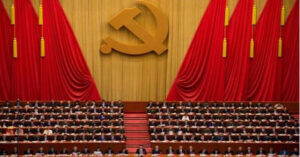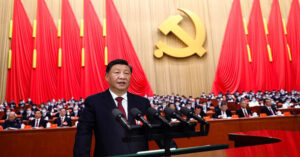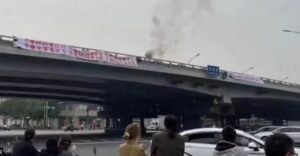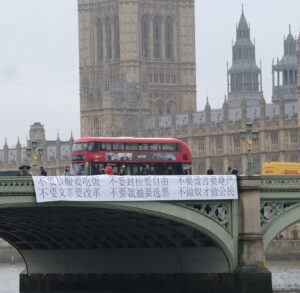 Tibetans living in Tibet live under the rule of the Chinese Communist Party (CCP) and the leadership of Chinese President Xi Jinping whose policies over the last ten years have systematically eroded their human rights and seen the loss of their traditional lifestyles, and of their livelihoods that have enabled them to live sustainably and in harmony with nature for centuries.
Tibetans living in Tibet live under the rule of the Chinese Communist Party (CCP) and the leadership of Chinese President Xi Jinping whose policies over the last ten years have systematically eroded their human rights and seen the loss of their traditional lifestyles, and of their livelihoods that have enabled them to live sustainably and in harmony with nature for centuries.
This month has seen the 20th National Congress of the CCPin Beijing – this is where the decisions are made that will affect the lives of Tibetans in Tibet. The Congress is a party congress held every five years and is, in theory, the highest body within the CCP, appointing top-level leadership changes as well as changes to the Party’s Constitution. It is expected that President Xi Jinping will win a third term of leadership. At this year’s Congress2,296 delegates represented the CCP’s 96.7 million members – of those 2,296, 38 people, or 1.6% represented Tibet – which accounts for a quarter of China’s landmass.
Chinese state media outlet chinadaily.com writes, “Xi Jinping, general secretary of the CPC Central Committee said the 20th National Congress of the Communist Party of China is a meeting of great importance. It takes place at a critical time as the entire Party and the Chinese people of all ethnic groups embark on a new journey to build China into a modern socialist country in all respects and advance toward the Second Centenary Goal” and says that the theme of the Congress is: “holding high the great banner of socialism with Chinese characteristics; fully implementing the Thought on Socialism with Chinese Characteristics for a New Era; carrying forward the great founding spirit of the Party; staying confident and building strength; upholding fundamental principles and breaking new ground; forging ahead with enterprise and fortitude and striving in unity to build a modern socialist country in all respects and advance the great rejuvenation of the Chinese nation on all fronts”.
The Congress
Here, decisions will be made that directly affect the lives of Tibetans living under the CCP’s regime in Tibet, as well as the other ethnic minority groups who suffer under CCP rule – the Uyghurs in East Turkestan [Ch: Xinjiang] and the people of Hong Kong and Southern Mongolia. The Congress attracts global media attention. The Washington Post writes, “Characterised by pomp, pageantry and paranoia, the event is often more about optics — a time for the Chinese leadership to impress upon the public the legitimacy of the CCP’s rule […] No effort has been spared to ensure the smooth execution of a crucial Chinese Communist Party congress this week where Xi Jinping is expected to extend his tenure as his country’s most powerful leader in decades”.
Xi Jinping: a Third Term?
 There is worldwide concern at the prospect of Xi Jinping securing a third tenure of office, Human Rights Watch (HRW) senior China researcher Yaqiu Wang, speaking on behalf of HRW, said, “President Xi’s precedent-breaking third term bodes ill for human rights in China and around the world. As the space for civil society activism further shrinks in China, it is imperative for the international community to take consequential actions to constrain Xi’s abuses.” HRW’s statement continues, “In the ten years since Xi came to power in late 2012, the authorities have decimated Chinese civil society, imprisoned numerous government critics, severely restricted freedom of speech, and deployed mass surveillance technology to monitor and control citizens. The authorities’ cultural persecution, arbitrary detention of a million Uyghurs and other Turkic Muslims, and other abuses since 2017 amount to crimes against humanity”.
There is worldwide concern at the prospect of Xi Jinping securing a third tenure of office, Human Rights Watch (HRW) senior China researcher Yaqiu Wang, speaking on behalf of HRW, said, “President Xi’s precedent-breaking third term bodes ill for human rights in China and around the world. As the space for civil society activism further shrinks in China, it is imperative for the international community to take consequential actions to constrain Xi’s abuses.” HRW’s statement continues, “In the ten years since Xi came to power in late 2012, the authorities have decimated Chinese civil society, imprisoned numerous government critics, severely restricted freedom of speech, and deployed mass surveillance technology to monitor and control citizens. The authorities’ cultural persecution, arbitrary detention of a million Uyghurs and other Turkic Muslims, and other abuses since 2017 amount to crimes against humanity”.
Reuters says, “In his decade in power, Xi has set China on an increasingly authoritarian path that has prioritised security, state control of the economy in the name of ‘common prosperity’, a more assertive diplomacy, a stronger military and intensifying pressure to seize democratically governed Taiwan […] Analysts generally do not expect significant change in policy direction in a third Xi term”, and, “China’s relations with the West have deteriorated sharply, worsened by Xi’s support of Russia’s Vladimir Putin”.
In Tibet…
The Congress is affecting the daily lives of people living in Tibet: in June, reports the International Campaign for Tibet, “China’s Ministry of Security launched a 100-day crackdown labelled ‘Hundred Days Action’ targeting illegal activities […] the crackdown has evolved into a campaign […] enforcing ‘stability’ in the lead-up to the 20th National Congress of the Chinese Communist Party […] In Tibet, in the run-up to the 20th National Congress, several apparently politically motivated arrests have been reported in the past months […] several Tibetans were reportedly arrested for possessing photos of the Dalai Lama or sharing information with contacts abroad”.
In Lhasa, Tibetans were ordered to stay home and watch China’s 20th Communist Party Congress on their televisions, reports Radio Free Asia, citing local sources. Many monasteries and schools across Tibet have were also instructed to watch the Congress. There is speculation that this was to prevent Tibetans from protesting against China’s rule during this time.
Global Protests

Protest in Beijing
Protests around the world, timed to coincide with the Congress, have demonstrated the power of the concern that people have about China. In Beijing, in an almost unprecedented act of protest and bravery, a protester lit a fire and draped two large banners over the Sitong bridge in the Haidian district calling for an end to China’s zero-Covid policy and for the overthrow of Xi Jinping – the banners were removed by the authorities immediately but footage of the demonstration spread online and has been reported around the world. The British BBC said, “A rare and dramatic protest in Beijing that criticised President Xi Jinping has sparked an online hunt for the mystery protester’s identity, as well as praise for the action”. Protesters in China know they will be arrested and imprisoned.

Protest in London
Photo : Free Tibet
In London, UK, activists led by Free Tibet have hung a banner at Westminster Bridge identical to the one hung in Beijing, to show solidarity with the Chinese protester – who was detained at the scene, and whose whereabouts are not known. Both banners translate as “We want food, not PCR tests. We want reform, not a Cultural Revolution. We want a vote, not a leader. We want freedom, not lockdowns. We want respect, not lies. We want to be citizens, not slaves.”
The BBC also reported that a “manifesto” calling for strikes and acts of disobedience had been posted on popular research site ResearchGate, calling to stop “the dictator Xi Jinping from illegally continuing in office, so that China can embark on the road to democracy and freedom”.
In the United Kingdom a peaceful demonstration outside the Chinese Consulate in Manchester saw Ben Chen, a Hong Konger, dragged by Chinese personnel into the Consulate compound and beaten. Footage is circulating on social media; he was left with injuries requiring hospital treatment. The BB Cagain, quoting Ben Chen, “I then found myself being dragged into the grounds of the consulate. I held on to the gates where I was kicked and punched, I could not hold on for long”; the incident only stopped when police intervened.
In the United States the CCP Congress has prompted two Congressmen to publish a statement in The Diplomat under the title “US Policy on Tibet Has Lost its Way. We Want to Change That” and drawing attention to the new Bill Promoting a Resolution to the Tibet-China Conflict Act.
While in Dharamshala, the Tibetan Youth Congress (TYC), the largest Tibetan non-government organisation, held a demonstration to protest against the Chinese Communist Party (CCP)’s illegal occupation of Tibet. “Over the last ten years, repressions in Tibet intensified with Tibetans subjected to extensive restrictions and hardships”, said TYC President Gonpo Dhondup.




 Print
Print Email
Email